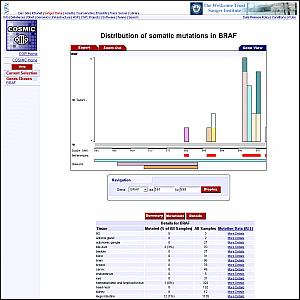COSMIC assault on cancer

In the quest to develop rational approaches to treating cancer, researchers need efficient access to existing knowledge. COSMIC (Catalogue Of Somatic Mutations In Cancer), which is launched on Wednesday 4 February by the Cancer Genome Project at The Wellcome Trust Sanger Institute, is a new tool that provides integrated genetic data from cancer genes, and will make research faster and easier.
One in three people in Europe and North America will develop cancer and one in five will die as a result. All cancers are ultimately a consequence of changes in the bases that make up DNA sequence. Changes in key genes can lead to more efficient growth of some cells, resulting in a tumour.
More than 260 genes have been identified that are mutated in cancer and a huge body of information has accumulated about the mutations in these genes. Currently, researchers have to go to many different sources to gather this data. A single, coherent and comprehensive resource – an A-Z of cancer genes and their mutations – would dramatically help cancer genetics and cancer biology.
“A genome-wide perspective of the genetics of cancer enormously enriches our understanding and can provide a much bigger picture, but perversely can also lead to information overload or fragmentation of knowledge. Recognising this paradox, we have designed COSMIC to assemble current knowledge of cancer gene mutations and link this data to other genome resources.
“COSMIC is not simply a collection of information, but a growing repository of the changes that are found in many cancer genomes. The data has been carefully assessed and curated by highly trained staff and is freely available to the research community.”
Dr Richard Wooster from the Cancer Genome Project at the Wellcome Trust Sanger Institute
COSMIC is designed to store and display somatic mutation data. In an initial stage, the database has been populated with information on four genes, BRAF, HRAS, KRAS2 and NRAS. The database already holds information on 57,444 tumours and reports a total of 10,647 mutations.
The information in COSMIC can be queried and displayed as a figure or various tables and exported to a number of formats. The database will grow as more results are assessed, examined and entered. In addition information from programmes such as the Cancer Genome Project, which is screening cancer genomes for further mutations, will be displayed in COSMIC. Ultimately information on all genes that are somatically mutated in human cancer will be included.
More information
- All cancers arise as a result of the acquisition of a series of fixed DNA sequence abnormalities, each of which ultimately confers growth advantage upon the clone of cells in which it has occurred. Over the past 25 years approximately 260 genes have been shown to be somatically mutated in cancer – that is the gene is mutated in the tissues of the person, rather than inherited from one or both parents. Mutations include deletions or rearrangement of DNA, although the most common mutations affect only one or a few base-pairs.
- The COSMIC database is designed to store somatic mutation data and currently includes information about somatic mutations in four genes; BRAF, HRAS, KRAS2 and NRAS. Nearly 900 scientific publications have been analysed in generating the database to date.
- This work was funded by the Wellcome Trust and the Institute for Cancer Research.
- The Cancer Genome Project is using the human genome sequence and high-throughput mutation detection techniques to identify somatically acquired sequence variants/mutations and hence identify genes critical in the development of human cancers. This initiative will ultimately provide the paradigm for the detection of germline mutations in non-neoplastic human genetic diseases through genome-wide mutation detection approaches.
Selected websites
The Wellcome Trust and Its Founder
The Wellcome Trust is the most diverse biomedical research charity in the world, spending about £450 million every year both in the UK and internationally to support and promote research that will improve the health of humans and animals. The Trust was established under the will of Sir Henry Wellcome, and is funded from a private endowment, which is managed with long-term stability and growth in mind. Websites: http://wellcome.org/ and Henry Wellcome.
The Wellcome Trust Sanger Institute
The Wellcome Trust Sanger Institute, which receives the majority of its funding from the Wellcome Trust, was founded in 1992. The Institute is responsible for the completion of the sequence of approximately one-third of the human genome as well as genomes of model organisms and more than 90 pathogen genomes. In October 2006, new funding was awarded by the Wellcome Trust to exploit the wealth of genome data now available to answer important questions about health and disease.


